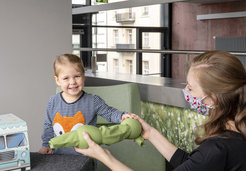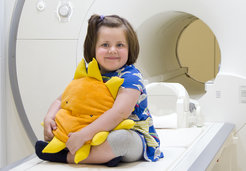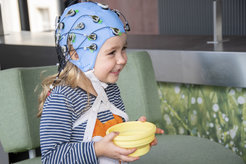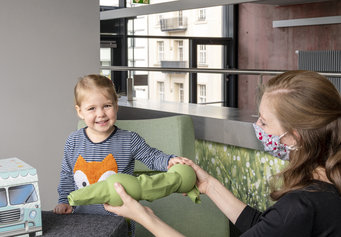Research Group Milestones of Early Cognitive Development
Within the first 4 years of life, children develop remarkable cognitive abilities in a number of different domains, from language, over reasoning, to social cognition. These early cognitive achievements are particularly prominent in the social domain. From very early in life, infants have a preference for social over non-social stimuli, are guided by the attention and actions of others when perceiving and encoding the world, and develop sophisticated expectations of others’ actions within the first year of life. By the age of 4 years, children have developed a multifaceted concept of themselves and others and are capable of reasoning about abstract, invisible concepts, such as the content of other people’s mind. This ability, referred to as Theory of Mind, allows us to make predictions about how other people will act, understand irony, and develop concepts such as morality. As such, Theory of Mind constitutes a hallmark of human cognition and social behavior. Our research group is guided by the question of how and when children come to understand others and themselves as thinking agents in the world. is guided by the question of how and when children come to understand others and themselves as thinking agents in the world.


Our Research Questions and Methods

Our research group investigates the cognitive and neural developments that drive the achievement of these milestones of human cognition in early childhood. We address these questions with behavioral and neuroscientific methods, including eye-tracking, functional near-infrared spectroscopy (fNIRS), electroencephalography (EEG), and magnetic resonance imaging (MRI). With the combination of these techniques we aim to identify the developmental onset, cognitive structure, and supporting brain networks of human social cognition. These methods allow us to study children’s reactions and brain activity in infant- and child-friendly ways. The neuroscientific methods allow us to obtain information on very young children’s perception and learning about the world without them needing to give a verbal or motor response. We are using well-established playful procedures that have been developed specifically for infants and toddlers.
Research Projects
(1) Do infants already understand what others think? – Early Theory of Mind development
When asked what other people think or believe, children typically do not answer correctly before the age of 4 years. According to the traditional view, the ability to understand what others think, therefore, develops late in preschool-age and relies on language. However, if not asked explicitly, but when observing children’s spontaneous non-verbal expectations of how others are going to act (for example in their gaze behavior or neural responses), they seem to take others’ thoughts and beliefs into account much earlier. That is, already in their first or second year of life, preverbal infants adapt their expectations of what the other will do, depending on what the other thinks. Our research indicates that there might be two fundamentally different ways of understanding others. On the one hand, there is a mature verbal way of reasoning about other people’s thoughts that develops in late preschool-age (referred to as verbal Theory of Mind). On the other hand, there are early non-verbal spontaneous action expectations that already preverbal infants and possibly even non-human primates have (referred to as non-verbal spontaneous Theory of Mind). A core objective of our group is to get a better understanding of these social abilities, when and how they develop, and what their cognitive and neural foundation is.
We are looking for children in the age of 6 to 20 months and 3 to 4 years who would like to participate in our studies.
If you are interested in participating, please contact: Ulrike Barth at 0341 99 40 140 or via email to meilensteine@cbs.mpg.de (please include your Phone number and the age of your child)
Project Contact: Charlotte Grosse Wiesmann
Involved Researchers: Charlotte Grosse Wiesmann, Katrin Rothmaler, Clara Schüler, Marie-Luise Speiger, Anna-Lena Tebbe
(2) Brain networks supporting verbal and non-verbal Theory of Mind processes
The goal of this project is to characterize and compare the brain networks involved in verbal and non-verbal spontaneous Theory of Mind behavior. To achieve this aim, we perform several studies with adults and children. By means of fNIRS and fMRI techniques, we study the regions of the brain that are particularly active during verbal versus non-verbal Theory of Mind tasks. With EEG and brain-structural MRI, we subsequently investigate how these brain regions are connected, and when, for how long and how often they exchange information. Diffusion MRI data provides information about the nerve fiber tracks between the communicating brain areas. Our first findings indicate that verbal and non-verbal spontaneous Theory of Mind are supported by distinct brain networks that are subject to specific developmental changes (e.g., Grosse Wiesmann et al., 2017; Grosse Wiesmann et al., 2020).
For this project we are looking for children in the age of 3 to 5 years.
If you are interested in participating, please contact: Dr Johanna Finnemann at 0341 9940 196 or via email to meilensteine@cbs.mpg.de (please include your Phone number and the age of your child)
Project Contact: Katrin Rothmaler
Involved Researchers: Philipp Berger, Charlotte Grosse Wiesmann, Katrin Rothmaler, Marie-Lusie Speiger
(3) Visual perspective taking and social memory biases
A first step towards finding out what other people know or think is to understand what they can see and how they see it. In the first or second year of life, infants start taking into account other people’s perspective when predicting their actions. We study when this ability emerges and how it develops over time. We are also interested in how infants’ own perception of their environment is influenced by what others see, or by what they have seen together with others. To study these questions, we use methods like eye-tracking and EEG that allow us to record how infants process what others see or what they expect to happen without the requiring them to give a verbal or motor response.
For this study we are looking for children in the age of 10 to 12 months.
If you are interested in participating, please contact: Ulrike Barth at 0341 99 40 140 or via email to meilensteine@cbs.mpg.de (please include your Phone number and the age of your child)
Project Contact: Anna-Lena Tebbe
Involved Researchers: Charlotte Grosse Wiesmann, Moritz Köster, Katrin Rothmaler, Anna-Lena Tebbe
(4) The development of understanding self and other
In this project we want to explore how infants begin to understand themselves and others. How do infants start reflecting on themselves and thus develop an idea of themselves? Does this influence how infants reason about other minds and understand other people’s perspectives? We aim to improve our knowledge on these cognitive processes and their neural basis by combining behavioral and neuroimaging approaches. Specifically, we look at infant’s behavior during playful asks and relate this to developmental changes of brain structure and connectivity in MRI imaging.
For this study we are looking for children in the age of 14 to 20 months.
If you are interested in participating, please contact: Dr Johanna Finnemann at 0341 9940 196 or via email to meilensteine@cbs.mpg.de (please include your Phone number and the age of your child)
Project Contact: Clara Schüler
Involved Researchers: Charlotte Grosse Wiesmann, Dora Kampis, Clara Schüler, Victoria Southgate
(5) Minimal Agency – investigating the onset of body perception and control
When are infants able to perform controlled bodily movements? The aim of this project is to investigate this question with behavioral paradigms and link the findings to theoretical debates about development of agency. The capacity to perceive and control one’s body is something that adults often take for granted. We are only confronted with our fundamental dependence on these capacities when they get disturbed for example in the case of a stroke. In contrast, when observing the early developmental transitions, a baby makes, one is prone to think that babies are not very capable of perceiving and controlling their bodies. In this project we investigate how infants develop control over their body and how this development drives the emergence of minimal agency.
For this study we are looking for children in the age of 6 to 10 months.
If you are interested in participating, please contact: Ulrike Barth at 0341 99 40 140 or via email to meilensteine@cbs.mpg.de (please include your Phone number and the age of your child)
Project Contact: Florian Teichmann
Involved Researchers: Charlotte Grosse Wiesmann, Kristina Musholt, Florian Teichmann


